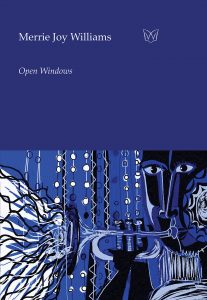Open Windows
 Songs drift from open windows: the radio, someone washing dishes, a tv, voices—more of an insight into people’s lives than the silent aquarium of closed glass. In Merrie Joy William’s collection, these open windows lead to childhood memories, romantic discovery, loss, life, faith and more. Her view into the past is never overly sentimental, but full of vivid details that allow her to step back into the voice of her younger selves. At the same time, she recognises the struggle of poetry to completely convey experiences in words, and there are multiple poems within the collection which allude to or address the writing process.
Songs drift from open windows: the radio, someone washing dishes, a tv, voices—more of an insight into people’s lives than the silent aquarium of closed glass. In Merrie Joy William’s collection, these open windows lead to childhood memories, romantic discovery, loss, life, faith and more. Her view into the past is never overly sentimental, but full of vivid details that allow her to step back into the voice of her younger selves. At the same time, she recognises the struggle of poetry to completely convey experiences in words, and there are multiple poems within the collection which allude to or address the writing process.
Part of the joy of William’s collection is her knack for re-creating the strange humour of a child’s perspective. Take for instance ‘First Friends’ in which the threat of another girl stealing her best friend becomes in William’s young mind epic in nature: a scab becomes a ‘horoscope caked on my knee in blood’ and the flautists who steal her friend away are girls who ‘only snacked/ on anger’ and ‘duelled to Dvorak’. Her verse sparkles with wit, finding both the humorous and poetic potential inherent in the everyday world. In ‘A Young Person’s Guide to the Orchestra’ she enjoys the tongue-in-cheek potential of blending sexual discovery and musical euphemisms. Through twanging alliteration she winks at us through the verse; at the wonder of, ‘get this, girls: a hooded gong’ and the discovery of her teenage body.
While the first section explores a mix of lighter childhood memories and her first passions, the second becomes more reflective. At the midpoint is the poem ’31 days’ which introduces for the first time the death of her father. To have it at this point in the collection is a strong choice, as it comes as more of a surprise—especially in contrast to the lighter tone of the first section. William’s skill for finding phrases brings to life the surreal and devastating emotions of that day, the vivid image of, ‘sucking/ leisure’s last jam through your second Cornetto’ contrasting sharply with the idea of grief calling, ‘some high-pitched mangling of your name’. It is hard to picture how else the poem might be written, or the images captured, and that in itself is a sign of skilled writing.
‘apples, hay, blossom, sky’ the year eight class brainstorms in the same poem when asked to write an ode to August- completely at odds with the poet’s true experience of the month:
But in August it rained. You think back again,
to your father’s car pelting a crowded M6.To oil slick, side-spin, blood-spattered airbag
words better suited to gracing that paper.
There is the sense through this ‘brainstorming’ of words, that she is struggling with how to express such intense emotions at such a young age. Now with greater experience she is able to produce this poem, but in recognising that struggle for words and that grief which has to break out of the structure to exclaim, ‘oh, cruellest of days!’, Williams is conscious that not everything can be embodied by poetry. Awareness of this limit of expression pushes her poetry further: we realise the depth of feeling because of the implication that it can’t fully be put on paper. In ‘The Diversion of Love’ the words the poet treasures most from her lover are not overwhelming, grandiose compliments, but the admission, ‘I can’t find the words tonight.’
In Open Windows memories and family fables are taken out and re-examined, shaped into a new reflection of the poet’s past and present. The experiences of her younger self are not dismissed as youthful naivety, but celebrated as powerful moments of self-discovery. Throughout the collection is the sense of careful consideration, a vivid awareness of the writing process. With a deft hand Williams throws open windows on her life, allowing us to link our experiences with hers, and better understand them together.

Leave a Reply